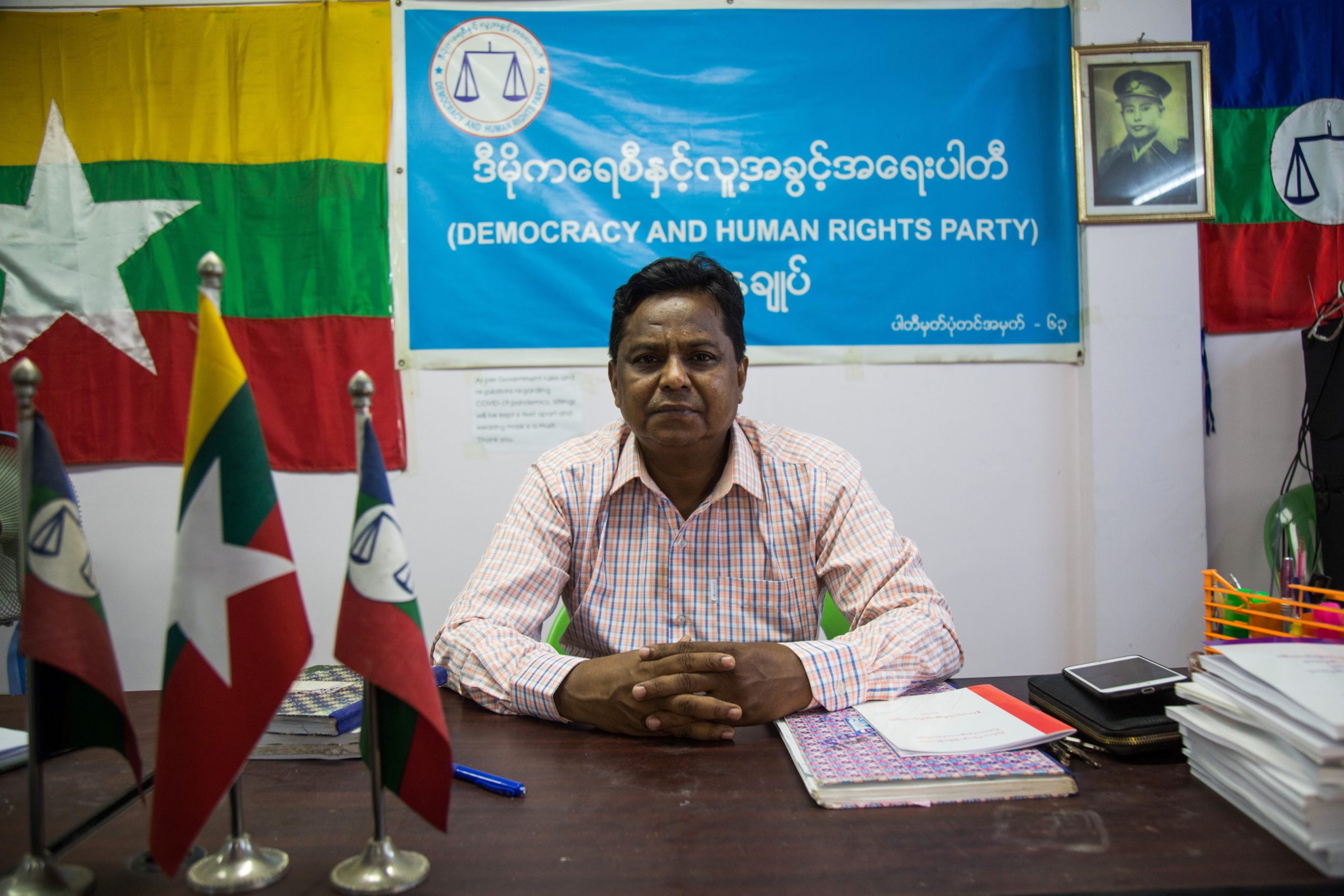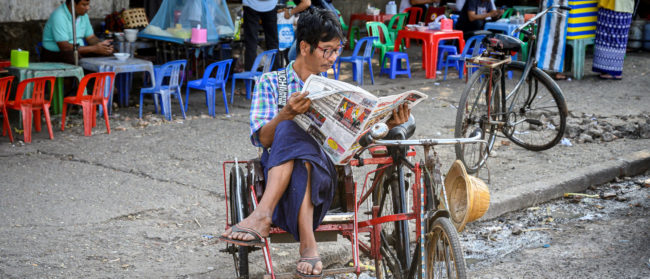As Myanmar’s election campaign kicked off this week in the shadow of Covid-19, Rohingya politicians continue to decry the legal quagmire barring them from competing in the country’s upcoming 8 November parliamentary polls. Critics say the move to exclude them is racially motivated and undermines the multi-ethnic country’s attempts at democratisation.
Fortify Rights, a human rights organisation based in Bangkok, reported in late August that six Rohingya politicians seeking to run for parliament had their registration rejected ahead of the election. The official reason was that, at the time of their birth, their parents were not citizens of the country then known as Burma, a prerequisite stipulated in the country’s restrictive election law of the Pyithu Hluttaw – Myanmar’s lower house of parliament. Election commissions have reportedly barred at least six other Rohingya political hopefuls for other reasons.
Abu Tahay, a Rohingya citizen of Myanmar who was set to run as an independent candidate in the election, told the Globe he was rejected under the parentage policy even though his grandparents were citizens of the state.
“The decision is not correct and it’s not going to benefit the Rohingya people or the other people of the country,” Tahay said. “This is just one of the many issues of discrimination based on ethnicity.”
The upcoming election would be only the third held in Myanmar since 1962, the year a military coup solidified a tradition of nondemocratic power. The results of the first multi-party election, in which Aung San Suu Kyi’s National League for Democracy party won a landslide victory in 1990, were dismissed by the military government, which then arrested several politicians and continued their rule. While Aung San Suu Kyi was famously placed under house arrest, Rohingya leader Kyaw Min, chair and founder of the Rohingya-led Democracy and Human Rights Party, was among those arrested.
Despite being eligible for that earlier, controversial election, Kyaw Min is now one of several Rohingya politicians now barred from participating in the contest this fall.
Tahay finds himself in a similar bind. He’d also been eligible to run in the past, and did so in 1990. Now, he says the law is being applied in a different way – one intended to prevent people like him and Kyaw Min from participating.
“This isn’t based on the law, it’s based on policy, a policy to make us excluded, to ban us from society,” Tahay said.
The lurch into an ostensibly democratic contest is branded by a deeper, structural commitment to assigning civic privilege on the basis of ethnicity, a trend that can exclude even the most powerful civilian leaders.
Suu Kyi, the country’s long-time opposition icon whose NLD party swept to victory in the subsequent 2015 polls and now holds a commanding presence in parliament, was legally ineligible to hold the office of president by way of her marriage to the late Michael Aris, an Englishman. Her current position – the role of State Counsellor, “hastily created” in the wake of the 2015 election to circumvent constitutional restrictions – elevated her to the most prominent role in civilian government, but still stands testament to the limits of her ability to rule unfettered in a country dominated by the military.
If legal restrictions codify exclusion for the likes of Suu Kyi, known reverently by her followers as Daw, or mother, Suu, they hold an even firmer grip on the prospects of the historically repressed Rohingya.
The hyper-focus on ethnicity is readily apparent in Myanmar’s running conflicts between the central military and the various ethnic armed organisations that purport to represent the interests of the country’s eight “major national ethnic races” identified by the government. John Quinley, a researcher with Fortify Rights, notes that many would-be voters in Myanmar stand to be excluded one way or another.
“But the Rohingya will be the largest group that will be disenfranchised en masse,” Quinley said. He added that some 600,000 Rohingya people living mainly in Rakhine could be kept from participating due to various restrictions, from the closure of polling stations in conflict zones to the inability to meet the requirements of the controversial 1982 national citizenship law, which defined a tiered programme of citizenship that favoured some ethnicities over others.
Rohingya have voted in the past, participated as civil servants, been in parliament, none of that is unprecedented … The disenfranchising of Rohingya today is part of a larger genocidal process
Quinley explained the upcoming election, like the one held in 2015, is “entangled with citizenship issues altogether” for the Rohingya. In the previous contest, voting access was tied to a “white card” issued to some Rohingya as a stand-in for citizenship documentation. After that card scheme was rescinded by the government, authorities rolled out the national verification card, a programme that has courted controversy through its refusal to recognise Rohingya as a distinct Myanmar ethnicity, instead classifying the group as Bengali or “other”.
Members of the predominantly Muslim ethnicity have traditionally made their homes in Myanmar’s western Rakhine State and have attempted to build a political foundation there to advocate for their interests in the Bamar-majority country. Though the group has long been at odds with the central government, the humanitarian crisis in Rakhine severely escalated amidst the 2017 “clearance operations” conducted by the Burmese military, also known as the Tatmadaw, which targeted Rohingya villages for destruction.
The Tatmadaw is also embroiled in conflict with the Arakan Army, an armed wing of the ethnic Arakan regional political movement, and has fought a much smaller armed contingent from the Rohingya known as the Arakan Rohingya Salvation Army. The national Union Election Commission, in accordance with Tatmadaw leaders, has hinted that polling stations in conflict areas could be shut down completely as a security measure.
The military campaign against Rohingya settlements culminated in massacres of civilians that drove survivors to flee into neighbouring Bangladesh, where now upwards of 800,00 refugees make a harsh living in camps outside the coastal city of Cox’s Bazar.
“Rohingya have voted in the past, participated as civil servants, been in parliament, none of that is unprecedented,” Quinley said. “But the disenfranchising of Rohingya today is part of a larger genocidal process that has been ongoing since at least 2012.”

The question of citizenship has been a central feature of the Rohingya struggle in Myanmar, where state officials make a point of not acknowledging the Muslim ethnicity by name, preferring to insist its members are Bengali migrants. In that context, would-be politicians like Tahay can be unusual for their own citizenship, much less that of their parents.
Election commission representatives hold that they don’t base decisions on ethnicity and are merely upholding election law, which holds that a candidate for the lower house of parliament must be born to two citizen parents. But, as with Tahay, the Rohingya being kept out of the election say the enforcement of the law has targeted them for that very reason, making unfounded claims to dismiss their family history while ignoring extensive documentation proving the contrary.
Abdul Rasheed, a member of the Democracy and Human Rights Party, said he was rejected by the Sittwe District Election Commission even though he’d been able to provide evidence of his parents’ citizenship. Rasheed has appealed the decision to the higher Rakhine State Election Commission and is adamant that he and others have been wrongfully excluded.
“We can say they are breaking the law,” he said in an interview, speaking of the commissioners. “It is illegal and baseless, it’s discriminatory on the basis of race and religion.”
Rasheed says he’s held citizenship since 1979, about 40 years now. But in his own case, there’s an additional sting. He says his father was a lifelong civil servant to the state and earned official recognition and, later, a pension, for his service to the young Myanmar. Pointing to that history, Rasheed says the election commission is not only attacking his own claims to belong but also that of his father, dismissing a decades-long paper trail to do so.
The end result is a system that has occasionally extended rights to Rohingya people only to rescind them when they become inconvenient, Rasheed said. For that reason, he argued, there could be little reason to expect the state to keep its word while addressing the myriad other issues the Rohigya face in Myanmar.
“The people who are eligible, they are not accepting them,” he said. “So how can we make a future for our children, for our people? How could the world expect this government to allow our people to succeed?”


